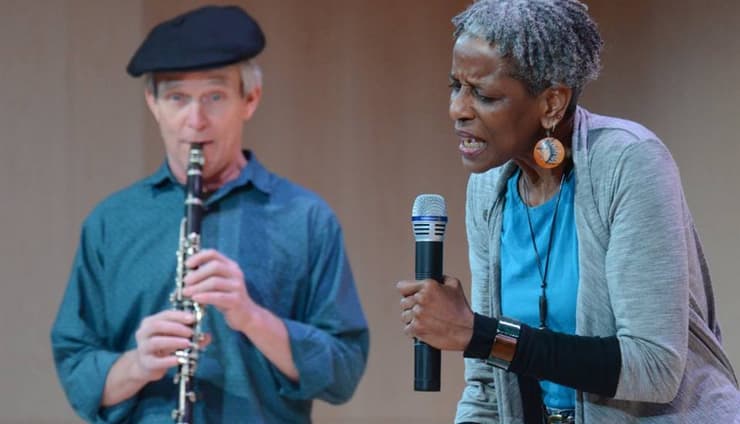By Philip B. Clapham, for Denverite
The Africa to the Americas Dance Festival is a celebration of the rhythmic traditions found throughout the African Diaspora. It's meant to recognize the pain and resistance of the trans-Atlantic slave trade, when Africans were stolen and enslaved throughout the Western Hemisphere.
Held in Boulder, the festival will gather some of the best West African and Latin American artists from the Front Range to perform all in one night.
Traditional Ghanaian drumming, African-American spoken word poetry, and a variety of dance performances are woven together into a seamless expression of how 500 years of history -much of it painful -- has given the world these expressive art forms.
"Africa to the Americas" is curated by Carmen Reina-Nelson, a Guatemalan-born dancer, choreographer, educator, performer and founder of Grupo Macondo and, as far as local dance historians know, the first Afro-Latin dance festival in Boulder.
What's a diaspora, you ask? Here's a quick recap.
Merriam-Webster defines it as the movement, migration, or scattering of a people away from an established or ancestral homeland. Most people who know the word associate it with the long history of migration and expulsion of Jewish people across the world. That's accurate. But this time, we're talking about Africa and Africans. Specifically, the ones who were stolen from its western shores during the trans-Atlantic slave trade.
These long, deadly, one-way sea journeys where people lay motionless in the cramped hulls of slave ships from West Africa to the Caribbean and the Americas are referred to as the Middle Passage.
Scholars estimate that over the history of the Atlantic-centered slave trade (there was a trade that continued in Arabia and India) somewhere between 11 and 15 million Africans were stolen for the production of cotton, sugar, coffee, indigo, and mining of gold and silver.
Class dismissed.
For more than 25 years, Reina-Nelson taught salsa, mambo, cha-cha-cha and other Latin American dances to soccer moms and undergraduates alike. These hip-gyrating dances are now commonplace in nightclubs and on television shows like "So You Think You Can Dance." But as Reina-Nelson explains, "these now popular dances are not merely a social pastime; they evolved over a period of 500 years." She soon became interested in the history of these dances and their sacred traditions.
Now this dancer-choreographer-turned-teacher has dedicated herself to researching the roots of the art form. She supports young artists and dance instructors, curating the festival as a way to bring together dance, music and poetry that have their rhythmic origins in Africa.
"The emotional impact of the performance is what's unique," said Reina-Nelson. "The audience is going to understand that these forms of poetry, music and movement came from West Africa to the Caribbean, Brazil and the United States, and while not exactly the same, they are cousins," she said. Her goal is to focus the audience on the evolution from painful beginnings to a more joyous present.
The program opens with Ghanaian drummers, overlapped by poetry from African American performance artist Norma Johnson. The night's journey then takes you to Cuba, with dancers performing traditional "son cubano," moving to Brazil for samba, before ending up in the United States for a tribute to hip-hop by Bronx-born dancer and CU Boulder instructor Larry Southall. After the show, attendees will get to dance themselves to the live Cuban jazz from Colorado-based Victor Mestas and Los Chicos Malos.
While the pernicious effects of slavery are still present within societies across the Americas, Reina-Nelson has hope that the festival is a way to highlight the connectivity we all share to Africa and the Caribbean.
"We've come a long way and have a lot to celebrate," she added. "We've got so many branches to this tree, and it's going to be fun to look back down and acknowledge the roots."
Africa to the Americas is co-produced by Carmen Reina-Nelson with assistance from EcoArts Connections. Tickets can be purchased from Eventbrite under "Noche de Celebración: Africa to the Americas." Doors open at 7 p.m.













